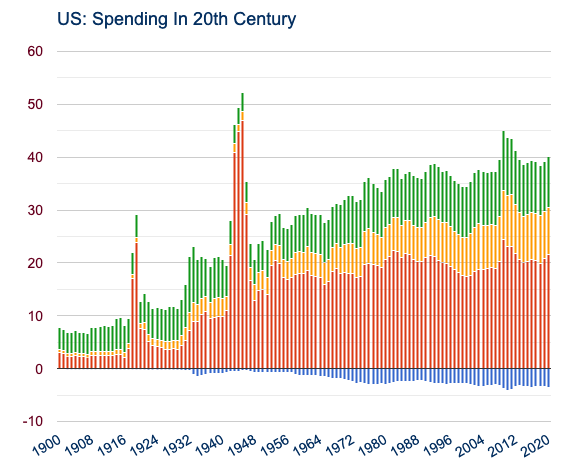
The coronavirus pandemic is laying bare quite a lot of the normally hidden features of our modern capitalism system. And the government reactions to the economic shutdown is demonstrating that we don’t actually live in an capitalistic system, but something of a hybrid with the incentives and rewards of capitalism (when times are good) but the downside cost of socialism (when the economy slows or shrinks).
Jumping out of the generalizations, the U.S. federal government has authorized over $2 trillion in handouts to people and corporations in the last month. $2 trillion for a government whose total income last year was just $3.5 trillion. A government that spent $4.5 trillion in 2019 on its normal operations.
That doesn’t count the other $6 trillion that the Federal Reserve Bank has already started allocating, to keep the money markets, financial markets, and in an unprecedented move, keeping the States, counties, and cities funded and operating.
In 2020 the plan is for $12.5 trillion in total government spending ($2T + $6T + $4.5T) into an economy that was itself just $19 trillion in size in 2019. An economy that could very well could shrink below $15 trillion in 2020.

As a percentage of GDP 12.5/19 = 65% and 12.5/15 = 83%. The peak of government spending in the U.S. was in the middle of WWII, when all non-essential manufacturing was repurposed to support the war. That peak was less than 50% for federal spending (red in the above graph) and 52% for all level of government (State budgets are in yellow and county/city in green).
Stepping back from what all that spending might or might not accomplish, clearly we are no longer living in Milton Friedman‘s free market capitalism. Neither are we living with just Alan Greenspan‘s market put. We’ve even gone a chapter or two past Ben Bernanke’s interventions created to deal with the last financial crisis.
The country (along with Canada and Europe) is clearly in a transition. Once upon a time the system let capitalists risk their capital in exchange for rewards (and potentially bankruptcy). Recessions and market drops were met with a bit lower interest rates to help spur growth in the follow year. Corporate losses were not met back then with bailouts, helicopter money, forgivable loans, and skip-past-bankruptcy cards for most every large company.
The rules now seem to be: when times are good and if I’m rich, I can risk and reward to my capital (and debt) limits, then when the black swan arrives, the government will not only let me keep my bet on the table, but hand me more chips to keep playing the game. If I’m not rich, I don’t get to play the game at all, good times or bad, but in bad times I’ll be placated with $1,200 plus a bit of extra unemployment notices the interest on the bailout loans are far less than the cost of the employee salaries.
It’s heads they win, tails we all pay.
What’s funny (not the haha type of funny) is that two months ago half the Senators and Representatives who voted in all this spending were tweeting and saying how crazy Bernie Sanders ideas were. That the U.S. isn’t Socialist. That Socialism is devil work. That Bernie’s ideas would cost the country trillions of dollars it couldn’t afford.
And yet here we are, with over $8 trillion in new government spending. Government programs that look far more like socialism than anything Friedman or Greenspan would argue as capitalism.
Funny how quickly a country can change.














